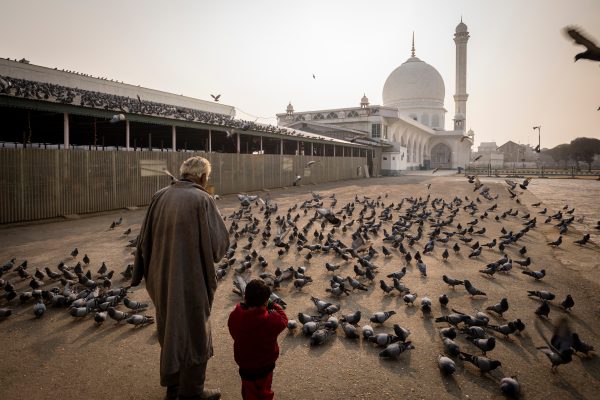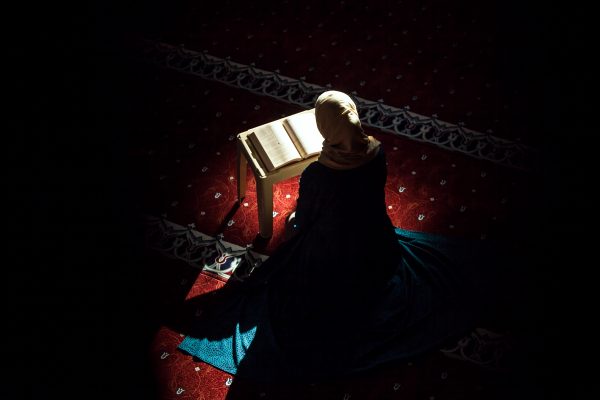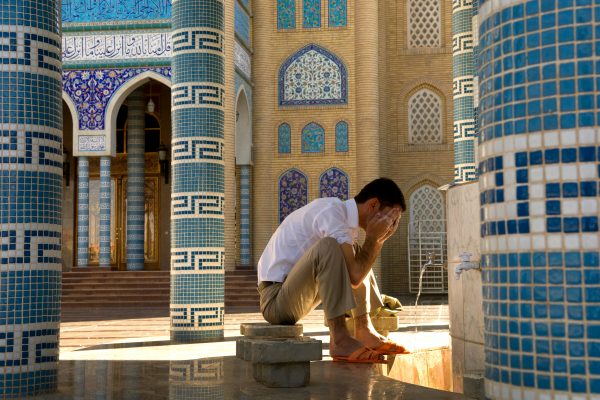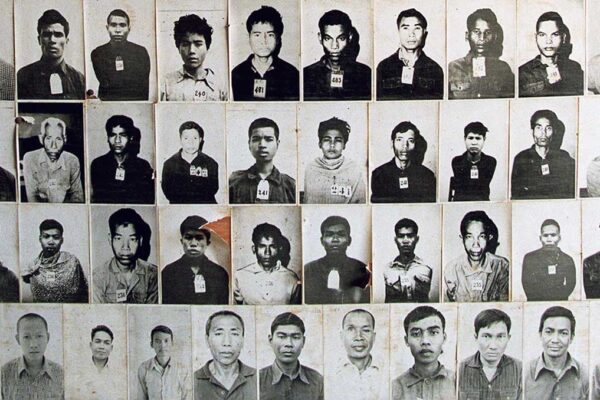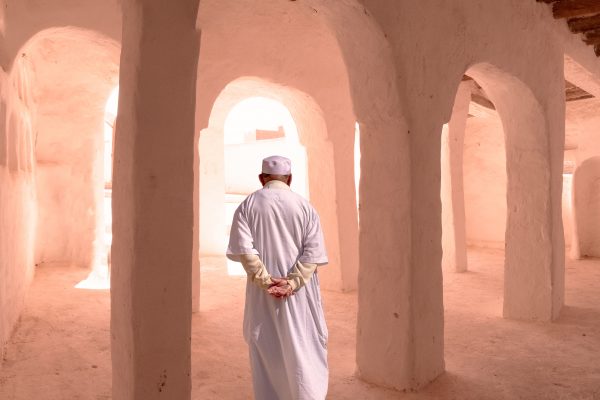Now it is up to us to choose if we prefer living in a society where all humans are equal and the diversity within is seen as a blessing from Allah, or we choose to make this earth liveable for some and miserable for others.
Now it is up to us to choose if we prefer living in a society where all humans are equal and the diversity within is seen as a blessing from Allah, or we choose to make this earth liveable for some and miserable for others.
The Almighty says: And I only created the Jinn and the Humankind to worship me (51:56). Based on the worldview of 7th century Arabia, the trilateral root ‘a-b-d refers to submitting to the will of the master and ensuring fulfillment of the obligation set by him. Hence, those who submitted to the Divine Will came to be known as Muslims and their submission was regarded as Islam.
For centuries, Muslims around the world have made efforts in their individual and communal capacity to understand what the Divine Will is and have devoted their lives and resources to seek the pleasure of Allah.
If one were to ask what is the Will of God, they would be met with responses like performing the ordained rituals and being an ethical and morally upright Muslim, often also regarded as Huquq ul-Allah and Huquq ul-ibad. A common Muslim strives to uphold both these aspects of his faith. Believers are constantly reminded of their duties in weekly sermons, in their reading of the scripture, and sometimes from within when they reflect on the signs of the Divine.
The struggle to please the Divine continues and suddenly one realises or is made to realise that perhaps some of God’s Will lies in the grey and it has to be reflected upon to grasp its true essence.
Muslims living in both Muslim-majority and diasporic communities are faced with a decision to make. A decision that not only affects them but has implications for the global population, in our times, and for many ages to come. The challenge at hand is to decide what should be one’s attitude towards those who have not submitted to the Will of God or if they have then perhaps their conception of the Divine Will is different.
It is said that when believers are faced with any dilemma, they should seek inspiration from the Holy Qur’an and the lived tradition of the beloved Prophet (peace be upon him and his progeny). It is also said that one should seek to understand the Divine guidance in its entirety in order to appreciate its true spirit.
Since Muslims – even those who belong to the same school – are not united under any single leadership, the onus of the decision at hand lies with all of us in our individual capacity. It is only after individual reflection that Muslims around the world will be able to discuss it at a communal level.
So, what are the possible options at hand? The first approach is to be pluralistic i.e. to accept that diversity is a fact and in order to live peacefully, one must not only be tolerant of the other but also, respect their beliefs and ideals. The second option is to consider diversity as a source of conflict and treat those who do not follow their understanding of religion as transgressors. The tacit understanding in the second option is that the other is tolerated on secular grounds bound by common citizenship, but the same level of respect, as extended towards a ‘right’ kind of Muslim, cannot be granted to the transgressors. And when the time is right, they should be subjugated to the Will of God.
At present, one can find support for both these attitudes among Muslims. The divine scripture, Prophetic tradition, and early history are filled with material that can be utilised in supporting or rejecting either of the positions.
The exclusivists, for instance, argue that the Qur’an makes it clear indeed the worst creatures in the sight of Allah are those who reject Him (8:55). Therefore, believers should fight them until there is no more tumult, and there prevail faith in Allah alone (8:39) or until they are willing to pay the tax (jizyah) and feel subdued (9:29). In fact, if one’s fathers and brothers prefer disbelief to faith, Muslims have been commanded to not even take them as allies and those who do so are transgressing (9:23). As for the People of the Book, they argue that God commands to not take Jews and Christians as allies because they are allies of one another and whoever takes them as ally is one of them (5:51). Furthermore, no religion other than Islam will be accepted in the Hereafter and they will be among the losers (3:85) because Islam is the (only true) religion in the sight of Allah (3:19).
The outcome of such an exclusivist approach is the continuous tension between the followers of different faith-based traditions. In fact, many Muslims belonging to different schools of thought do not respect each other and strive to make evident the deficiency in other’s beliefs. In such a scenario, diversity becomes a source of conflict instead of becoming an opportunity to learn from each other.
This approach not only ruins societal peace but also makes people discriminate against others. The ugly manifestation of internalising an exclusivist approach can be seen in recent examples that took place in the blessed month of Ramadan in Pakistan and the UK. In the former, some people refused to accept donation and grocery from an NGO whose trustees were Shia; and in the latter, a handful of Muslims not only regretted donating towards the cause but also revoked their condolences when they got to know that the young girl who had been shot was of Shia background.
On the contrary, those who favour the pluralistic approach rely on a different set of Qur’anic verses. They argue that humankind has been created from a single soul (4:1) in the best of moulds (95:4). And it was the Divine Will to divide people into tribes (49:13) laws and methods, and if Allah had willed, He would have had made humans one community (5:48). They argue that humans have been bestowed with fitrah – the natural disposition within all humans to turn towards the truth (30:30), because of which God honours humans over many other creations (17:70). And it is not just the Muslims who would be granted salvation on the Day of Judgment but as the Qur’an cites: the Jews, the Christians, the Sabeans, anyone who believes in God, the final day, and does good will be rewarded (2:62; 5:69; 3:113-15). In fact, the authority to judge between people – believers or not, lies with Allah alone (22:17) hence, the believers should avoid passing judgments or discriminating in this world on the basis of religion or otherwise.
As for the diversity among Muslims, the pluralist approach guides that historical circumstances, lack of access to complete information, multiple approaches and readings of the text allow the possibility of differences in interpretation. In such a situation, one should act with humility – accepting the fact that it is not possible for any individual to master all knowledge and claim that they understand the true intention of the Divine behind any verse. This humility allows the possibility of perceiving Divine reality in more than one way.
The pluralistic approach allows an individual to focus on the shared aspects and celebrate them rather than to become obsessed with differences. For instance, all human beings are united by the fact that they share a common descent – a spiritual connection that makes us care and nurture each other. Similarly, all Muslims are united by their affirmation of Shahadah – a beautiful proclamation that acknowledges the existence of the Divine and His mercy based on which He sent the Prophet for our guidance.
Having said this, being pluralistic does not imply that with time the differences will cease to exist. In fact, it allows individuals to be secure with their respective normative beliefs and identity. When everyone is made to feel included and has trust in the system, it allows not only peaceful coexistence but also the realisation of individual and communal potential.
One beautiful manifestation of this pluralistic approach is the Cathedral Church of St. Paul in Boston, Massachusetts where up to 350 Muslims have been performing their Friday prayers since August 2000. A few years ago, the church administration went above and beyond to make Muslims of the Boston downtown area feel welcomed and included. They replaced the existing benches with chairs to make the space easily convertible, removed the carpet to improve the acoustics, and most importantly, changed the design of the bathroom to make space for traditional Muslim ablution.
To conclude, it is apparent that there can be plenty of verses in favour and against both the perspectives based on the context of revelation, Prophetic sayings, the early tradition of tafsir, etc. I do not mean to hide that many of the verses cited in favour of the pluralistic approach were revealed during the early period whereas, some verses often quoted by the exclusivists were revealed during the final two years of the Prophethood. Nor do I want to fail to acknowledge that many Muslims in Kashmir, Palestine, Burma, Syria, Yemen, and many other places are suffering at the hands of those who sometimes happen to be the followers of other faith-based traditions. But many would agree when I say that much of the conflict in these and other areas has more to do with power struggle and poor governance than with religious ideology.
The two approaches that I have talked about relate to common people and the decision has to be taken at an individual level. If we are clear based on our reflection which approach is suitable for humankind, then we will be in a better position to appreciate the Divine Will and seek Allah’s pleasure and mercy. Now it is up to us to choose if we prefer living in a society where all humans are equal and the diversity within is seen as a blessing from Allah, or we choose to make this earth liveable for some and miserable for others.





